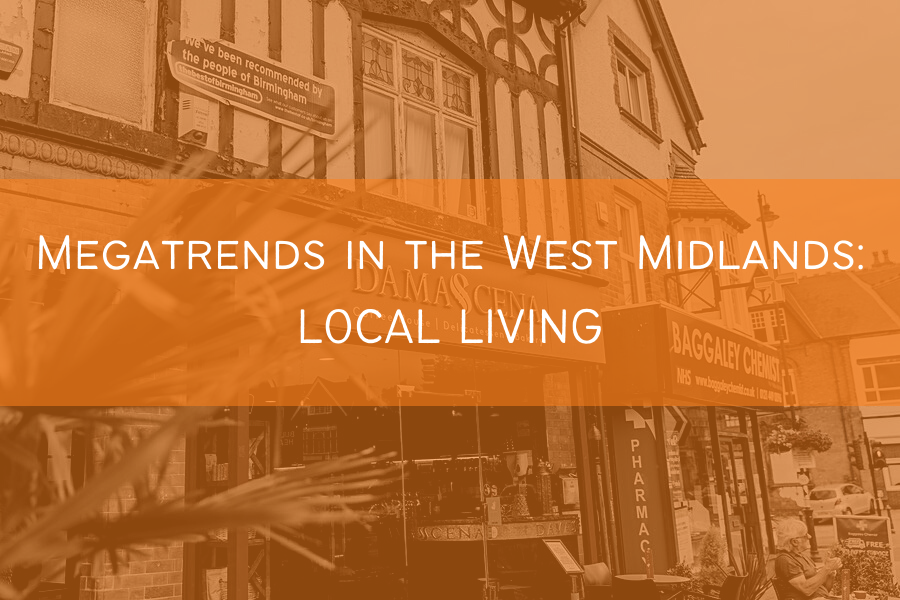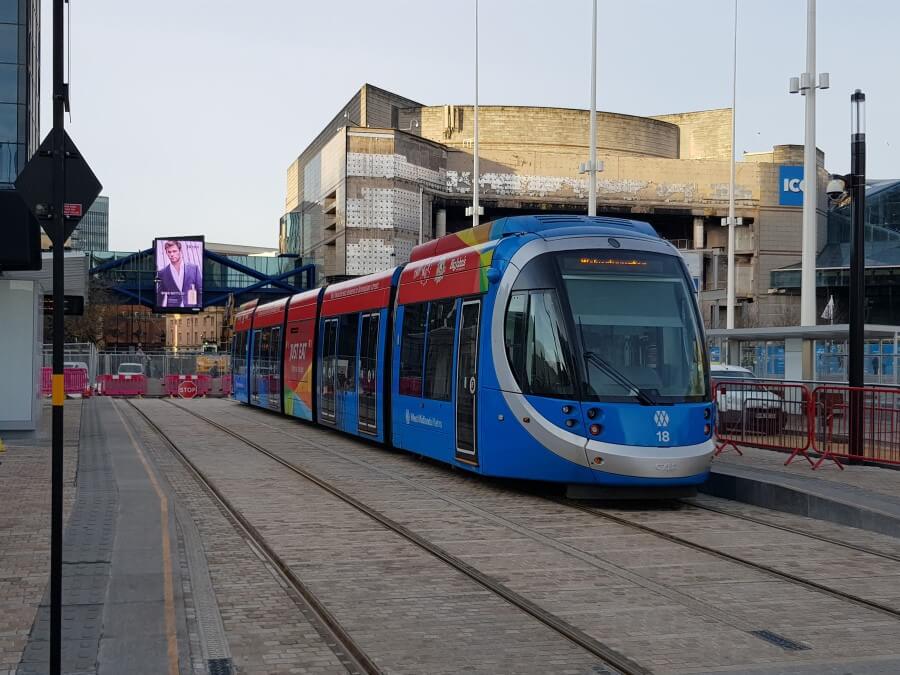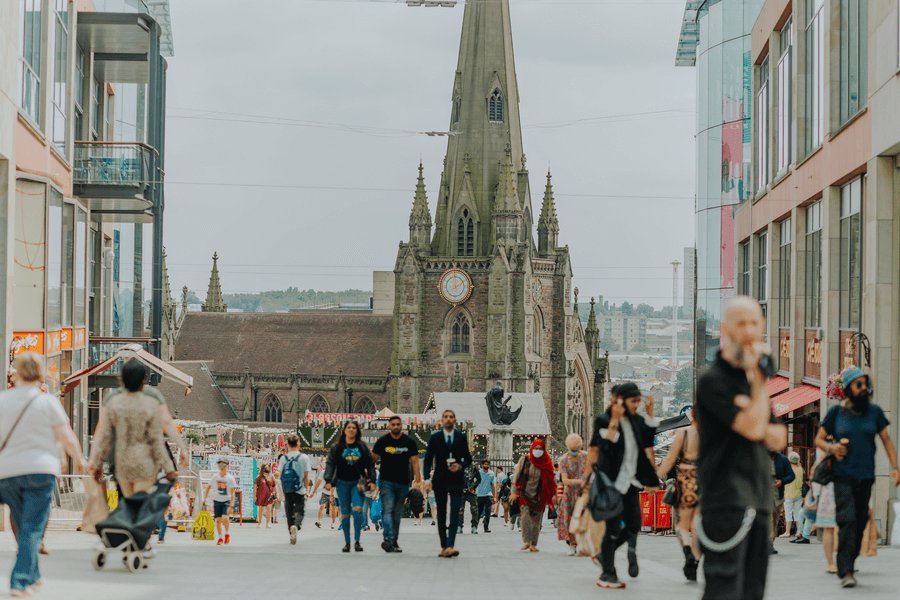
Gina Hunt examines the megatrend of local living, brought on by Covid-19, causing people to stay at home or in their own locality, increasing homeworking and spending money locally in their neighbourhoods. This article is part of larger project looking at Megatrends in the West Midlands. Megatrends are major movements or patterns or trends that are having a transformative impact on business, economy, society, cultures and personal lives. The project examines some of these megatrends in a series of provocations, podcasts and a report. View the full provocation.
Working from Home
The pandemic is predicted to have a dramatic effect on pre-lockdown working habits, with 74% of businesses intending to continue remote working (Gartner, 2020). With up to 29% of workers in Birmingham being able to work from home (Magrini, 2020), city centres will see a sustained decrease in footfall during the week. Even for those still commuting, the pandemic has restricted the spatial scale of daily life, confining exercise and leisure time to the home and its immediate vicinity. These new modes of living entail shorter distances – what the French call ‘hyper-proximity’ – that could redefine our cities. Localised service delivery and increased pedestrian and bike infrastructure are central design principles of the ’15-Minute City’, and they hold the potential to restructure our neighbourhoods into active, self-sufficient and community-oriented spaces.

Transport
40% of global transport emissions come from cities, and continued car dependence would see urban growth add another 26% to global CO2 emissions in the next 30 years (International Transport Forum, 2018). Yet the 2020 lockdown saw swathes of cars removed from our streets, with temporary activations increasing pedestrian space, and bike lanes and low-traffic neighbourhoods giving citizens new ways to travel and explore their city. The smart mobility solution of the post-pandemic city will not be electric vehicles or public transport solutions, but instead the creation of a city where walking and biking are the easiest and fastest ways to get around. Short car trips under 5 miles made up 70% of all UK car journeys pre-pandemic, proving the feasibility of this large-scale transition to human-powered mobility (Living Streets UK, 2021).

Risk to city centre economies
However, this transition to local living does present risks for city centre economies. Increased reliance on online shopping and the forcible closure of retail and hospitality have accelerated the already worrying decline of British high streets. According to the Centres for Cities High Street Tracker, Birmingham is in the bottom 10 UK cities for footfall recovery in the city centre, with an overall city centre recovery index of just 16% compared to pre-lockdown levels (Centre for Cities, 2021). The mixed-use development will be key to keeping Birmingham’s city centre vibrant and diverse, as retailers will have to appeal to increasingly ethical consumers, keen for a unique shopping or dining experience that they can’t buy online. This trend suggests that independent and bespoke local urban centres may see a post-pandemic upswing, whilst shopping centres and out-of-town retail parks may lose out to online retailers.

Devolution
The majority of citizens think that the pandemic has strengthened our communities, with the number of respondents who believe that Brits ‘look after each other’ rising from 24% to 46% between February and September 2020 (More in Common, 2020). Two-thirds of Brits now believe that they can make a difference in their community – a 16% increase from pre-pandemic levels – evidencing a growing desire for local-level political action. The pandemic has seen an increase in political support for local government initiatives that prioritise the local community, most notably the imposition of rent controls and the provision of housing for the homeless. Demand for political decentralisation and stronger local institutions have gained high-profile status, with Greater Manchester Mayor Andy Burnham highlighting the imbalanced postcode lottery of the UK’s tier system. There is an opportunity for post-pandemic communities to sustain this momentum, prioritising local community interests above centralised government objectives.
Key Policy Messages
- Local living means shorter journeys, creating more opportunities for walking and cycling and reducing dependence on automobiles. As well as being environmentally beneficial, active travel brings dramatic physical and mental health benefits. Improving bike lanes and pedestrian spaces will be vital to recovering from the inactivity and mental strain of lockdown, securing a green, healthy, and happy recovery.
- However, fears over the safety of public transport could see the pendulum swing back towards personal car use. Disincentivising car dependency will be crucial in preventing an environmentally damaging and socially harmful recovery from the pandemic.
- The steep increase in home working has bought local high streets and urban centres new custom, whilst large city centres have seen a dramatic decline in footfall. High streets will need to become interactive and experiential mixed-use venues, with independent commercial offerings that can rival online megabrands. A high-quality public realm will be key to creating high streets and urban centres that people want to spend time and money in.
- Spending more time at home has increased local consciousness and camaraderie among neighbours. Covid-19 has reminded us why our local community is vital, and this strong neighbourhood identity should be carefully nurtured to ensure a localised social support system to assist our pandemic recovery.
This article is part of a larger project looking at Megatrends in the West Midlands. Megatrends are major movements or patterns or trends that are having a transformative impact on business, economy, society, cultures and personal lives.
The project examines some of these megatrends in a series of provocations, podcasts and a report.
This blog was written by Gina Hunt.
Disclaimer:
The views expressed in this analysis post are those of the authors and not necessarily those of City-REDI / WMREDI or the University of Birmingham.
